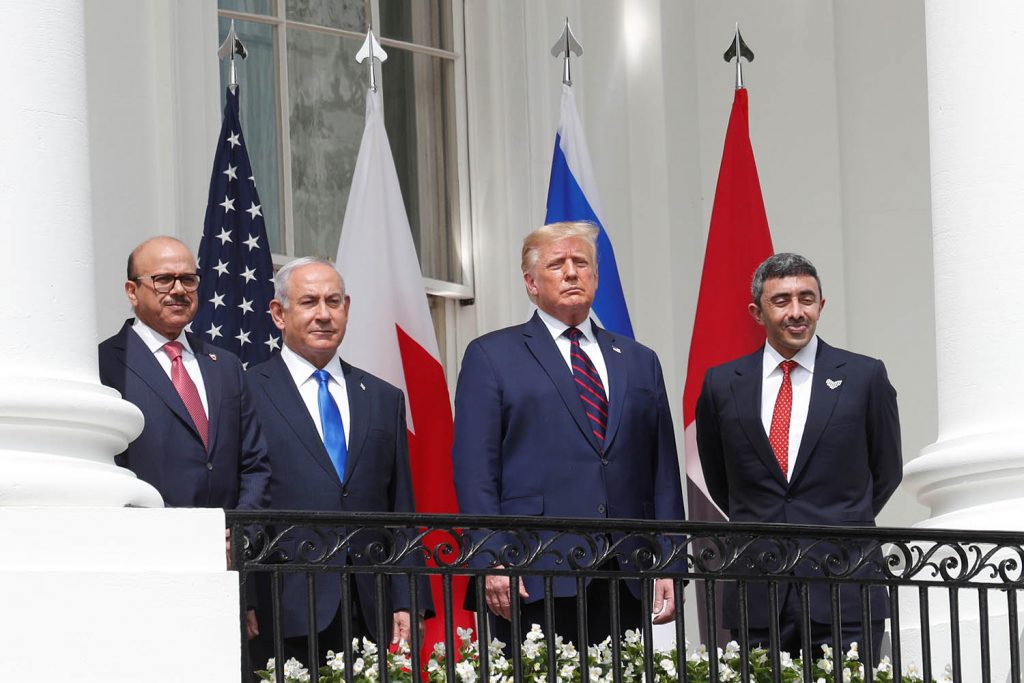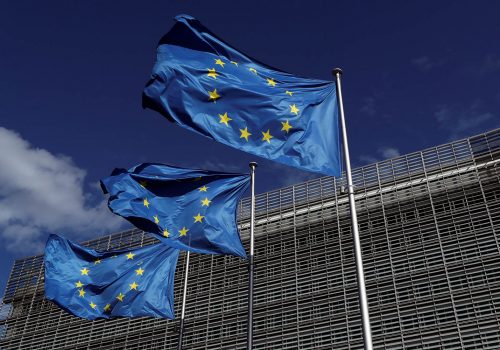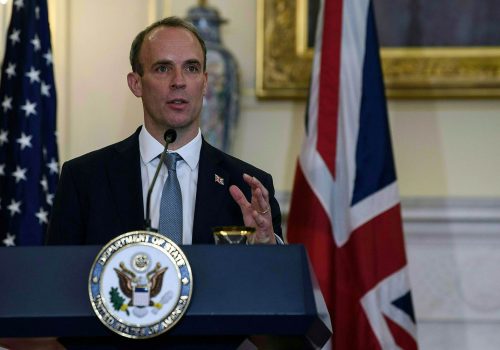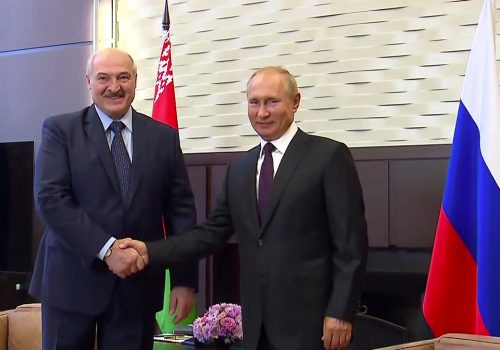Forty years ago this month, when I was the junior correspondent in Newsweek’s bureau in Bonn, Germany, my boss marched into my office and boasted that he was off to the Middle East to interview Egypt’s Anwar Sadat and Israel’s Menachem Begin on peace prospects after the Camp David Accords.
The magazine’s editors had reserved the cover!
My consolation prize, or so it seemed at the time, would be to cover the unfolding Solidarity strikes in Poland. Yet that story over time would trigger revolutionary changes in Europe favoring freedom, while the Mideast remained mired in extremism, despotism, and divisive animosity.
It was worth reflecting on those comparative European and Middle Eastern fates while watching this week’s signing at US President Donald Trump’s White House among the United Arab Emirates, Bahrain, and Israel of normalization agreements. Because of the nature and the timing of these deals, they present the region its best opportunity perhaps ever to bury its bloody, self-defeating past and embrace moderation and modernity.
Yet that will only be true if the parties can work with international partners to protect the so-called Abraham Accords Peace Agreement—named for the common patriarch of Muslims, Jews, and Christians—from extremist assault and from Israeli hardliners bent on territorial expansion.
Beyond that, the parties should work to expand the agreements to embrace more Arab countries and eventually spawn rules-based institutions that could become the regional equivalents of the European Union, NATO, and a CSCE-like reconciliation process through which they settle economic, political, and human rights differences.
Get the Inflection Points Newsletter
Subscribe to Frederick Kempe’s weekly Inflection Points column, which focuses on the global challenges facing the United States and how to best address them.
A World Economic Forum report this year demonstrated how greater economic integration, reduced regulatory barriers, and freer movement of people and capital could result in a doubling of Mideast GDP within a decade—and that was before the notion of including Israel.
It’s been a safe bet over the last four decades—roughly the time I’ve been following Middle Eastern affairs—to “short” the region, as other parts of the world have moved ahead economically, technologically, and politically. Not even historic peace deals between Israel and Egypt in 1979 and fifteen years later between Israel and Jordan did much to change that trajectory.
Even now, it would be naïve to ignore the impediments: historic distrust, religious intolerance, and intractable conflicts of the sort unfolding in Libya. Yet I’ve also sensed something more promising in the air in recent trips to the Middle East, particularly among the young: a frustration with the status quo, a hunger for a better future, and an impatience for change.
That and a more pragmatic generation of national leaders makes possible what Anwar Gargash, the United Arab Emirates’ minister of state for foreign affairs, referred to as the possibility of a “warm peace.”
What Gargash meant by “warm peace,” in part, was that the UAE’s relationship with Israel can be less complicated because “unlike Jordan and unlike Egypt, we have not fought a war with Israel.” Thus a “warm peace” could be less about ending hostility and more about sharing technology, generating investment, closing business deals, and exchanging intelligence to more effectively counter threats from Iran and other potential spoilers.
There’s a long road from here to there. However, one could see possibilities for a more lasting breakthrough in the twenty-nation Arab League’s rejection of Palestinian efforts to condemn this week’s agreements. Despite the opposition of their leaders, Palestinians in the end could be the biggest benefactor in a two-state solution embedded in a more vibrant and integrated Middle Eastern economy.
Even President Trump’s harshest critics are giving him and his son-in-law Jared Kushner credit for this Mideast achievement, casting aside traditional thinking that no regional breakthrough was possible until the Israel-Palestine conundrum had been solved.
This deal turns that logic on its head.
“When the most technologically advanced and globalized Arab state, the UAE,” writes Thomas Friedman in The New York Times, “decides to collaborate with the most technologically advanced and globalized non-Arab state in the region, Israel, I suspect new energies will get unlocked and new partnerships forged that should be good for both Arab-Israeli and Jewish-Muslim human-to-human relations.”
What’s been less recognized is the geopolitical importance of these agreements. The UAE timed its efforts to head off Israeli annexation of parts of the West Bank, but it was also in response to growing uncertainties about US engagement in the region following three presidents who, each in his own way, have cast doubt on America’s traditional role as security guarantor.
Arab states, already countering Iran’s efforts to destabilize the region, have been increasingly concerned by Turkish encroachments from Libya to Syria and from Somalia to Qatar. Both Iran and Turkey have condemned the agreements, and neither is going away anytime soon.
Major powers are also expanding their presence. Russian intelligence, military, and diplomats are increasingly present and active across the region. China has become the top trading partner for Iran, Iraq, Saudi Arabia, and the UAE, and its recent historic agreement with Iran looks out twenty-five years.
In this shifting landscape, how better for the UAE and Bahrain to lock in close security relations with the United States than by normalizing with Israel? If Sudan becomes the next country to normalize, as is expected, it could shift its reputation in Washington overnight from state-sponsor of terror to friend. Morocco and Oman could follow—and a modern, moderate coalition could become reality alongside Egypt and Jordan.
The most dramatic shift in the region would be if Saudi Arabia normalizes with Israel, something Saudi diplomats insist won’t happen until the Palestinians get their two-state solution. That said, Crown Prince Mohammad Bin Salman signaled his support for the UAE-Bahrain agreements through opening Saudi air space for commercial flights to and from Israel.
There’s also significance to what some Saudis on Twitter refer to as the “normalization sermon” on September 5 by Abdulrahman al-Sudais, imam of the Grand Mosque in Mecca, and broadcast on Saudi state television. He spoke of how the Prophet Mohammed was kind to his Jewish neighbor and argued the best way to convert Jews was to “treat them well.”
It took courage, amid considerable risk, among the parties to reach last week’s agreements. It’s time for international partners to weigh in and support this historic opportunity to convert the region’s heartache to hope.
This article originally appeared on CNBC.com
Frederick Kempe is president and chief executive officer of the Atlantic Council. You can follow him on Twitter @FredKempe.
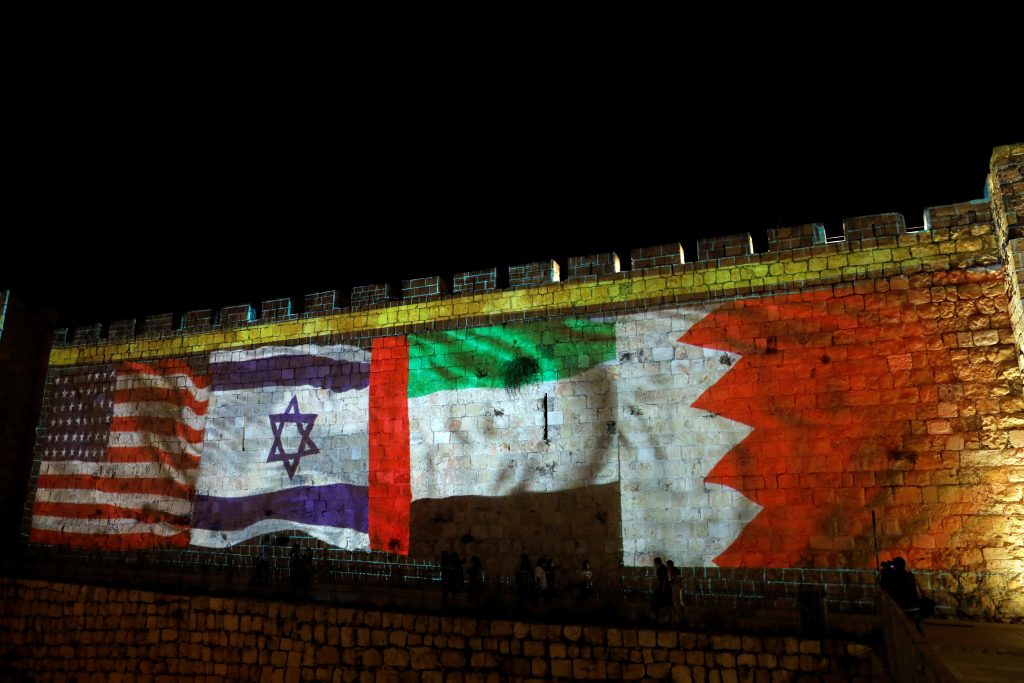
THE WEEK’S TOP READS
Four of this week’s top reads offer different takes on this week’s Middle East agreements.
Bret Stephens in the New York Times tracks the death of conventional wisdom that a Palestinian deal would need to precede other regional agreements. Madeleine Albright and Stephen Hadley in Politico Magazine see the value of the agreement in how it could unlock the human potential of the region.
The Atlantic Council’s Will Wechsler takes a smart look at the shifting geopolitical landscape of the Mideast, driven in no small part by concerns regarding US withdrawal. The week’s must-read on the Mideast comes in the Wall Street Journal, whose reporters deliver a riveting look at disagreements between 35-year-old Saudi Crown Prince Mohammed bin Salman and his father, King Salman, over whether and how to grow closer to Israel.
The final item is Jill Lepore’s salute in the New Yorker to Ruth Bader Ginsberg, the legendary Supreme Court justice who passed away on Friday at age 87. “Aside from Thurgood Marshall,” she writes, “no single American has so wholly advanced the cause of equality under the law.”
#1. AN ALLIANCE OF MODERATES AND MODERNIZERS?
A Rare Middle East Triumph
Bret Stephens / THE NEW YORK TIMES
Writing in the New York Times, Bret Stephens argues that the process of normalizing ties between Arab states and Israel shows “how wrong a half century of conventional wisdom has been” that only untying the “Gordian knot” of the Israel-Palestine conflict can bring peace to the Middle East region.
Instead, “the best option is an alliance of moderates and modernizers,” he writes. Stephens hopes that US-brokered deals between Israel on the one hand, and the UAE and Bahrain on the other, can pave the way for a genuine path to stability in the region, one that is based on “shared aspiration.”
“With Friday’s announcement,” writes Stephens, “that Bahrain would join the United Arab Emirates as the second Arab state in thirty days to normalize ties with Israel, the administration has done more for regional peace than most of its predecessors, including an Obama administration that tried hard and failed badly.” Read More →
#2 A BIPARTISAN BLESSING
How Trump’s Middle East Plan Could Boost the Region
Madeleine K. Albright and Stephen J. Hadley / POLITICO MAGAZINE
In Politico Magazine, former secretary of state Madeleine K. Albright and former national security advisor Stephen J. Hadley highlight the positive prospects for the Middle East after this week’s historic agreement. (Albright serves on the Atlantic Council International Advisory Board and Hadley is executive vice chair of the Atlantic Council Board of Directors.)
“If the UAE and Bahrain initiatives lead to the kind of evolution we envision,” they write, “they would not only advance the prospects for peace and prosperity in the region but also could begin a strategic shift in which the countries in the region take more responsibility for defining its future.”
Write Albright and Hadley: “Although Palestinian groups generally have been unhappy with these deals, we believe they could eventually benefit other Arab states and the Palestinian cause as well. The next US administration, whoever leads it, should encourage these developments, but the nations of the Middle East will need to take the central role.” Read More →
#3. “A NEW POLITICAL ORDER”
Tomorrow’s Middle East is Emerging Today
Will Wechsler / NATIONAL INTEREST
Writing in the National Interest, the Atlantic Council’s Will Wechsler delivers the smartest reflection I’ve seen yet on the significance of the UAE-Bahrain-Israel agreements in the context of the shifting geopolitics of the Middle East.
“The principal factor that explains the most about the emerging geopolitics of the Middle East is the widespread perception of coming US withdrawal,” he writes, following three consecutive US presidents who have, in their own ways, “deviated from the traditional US role of upholding the regional status quo.”
He traces how Iran, Turkey, Russia, and China are each filling the vacuum, with differing impacts on the geopolitical order. It’s in that context he sees the emergence of a new coalition of moderate Arab states aligned with Israel and the US as “indisputably a positive development … since a region dominated by Iran, Russia or Turkey does not serve American national security interests.” Read More →
#4. LIKE FATHER, NOT LIKE SON?
Saudi Royal Family Divides Over Potential Embrace of Israel
Stephen Kalin, Summer Said, and Felicia Schwartz / THE WALL STREET JOURNAL
“An argument is raging behind palace doors in Saudi Arabia,” write Kalin, Said, and Schwartz on the front page of the Wall Street Journal. “Now that the United Arab Emirates and Bahrain have forged ties with Israel, should the king follow suit?
Their piece is an account of how Saudi King Salman, age 84, “has been at odds with his son (age 35), Crown Prince Mohammed bin Salman, over embracing the Jewish state.” It is at the same time the story of generational differences toward the Palestinian cause and potential changes in Saudi Arabia as the crown prince takes on more authority.
They report that Prince Mohammed didn’t initially tell his father about the planned agreement, which didn’t mention Palestinian statehood, and that after he found out “a furious King Salman later ordered his foreign minister to restate the kingdom’s commitment to the establishment of a Palestinian state, without mentioning the normalization deal.”
For those intrigued by Saudi palace politics at such a historic moment, this is a must-read. Read More →
#5. EQUALITY UNDER THE LAW
Ruth Bader Ginsburg, a Pioneering Justice on Supreme Court, Dies at 87
Jess Bravin / THE WALL STREET JOURNAL
Ruth Bader Ginsburg, the Great Equalizer
Jill Lepore / THE NEW YORKER
It’s fair to say that at no point in history has any other Supreme Court justice matched Ruth Bader Ginsburg’s rule as such a powerful figure of the judicial branch, such a feminist icon in the fight for equality of the law and, much to her own bemusement, an unlikely pop culture phenomenon.
“Her face appeared on T-shirts and handbags,” writes Jess Bravin in the WSJ, “often with the nickname, ‘Notorious R.B.G.,’ a mashup of her initials and the late rap star Notorious B.I.G.” She was featured in a documentary, celebrated in a comic opera, and her daughter-in-law wrote a series of songs recounting episodes in her life. Read More →
Jill Lepore in her New Yorker profile writes, “Ginsburg bore witness to, argued for, and helped to constitutionalize the most hard-fought and least-appreciated revolution in modern American history: the emancipation of women. Aside from Thurgood Marshall, no single American has so wholly advanced the cause of equality under the law.” Read More →
QUOTE OF THE WEEK
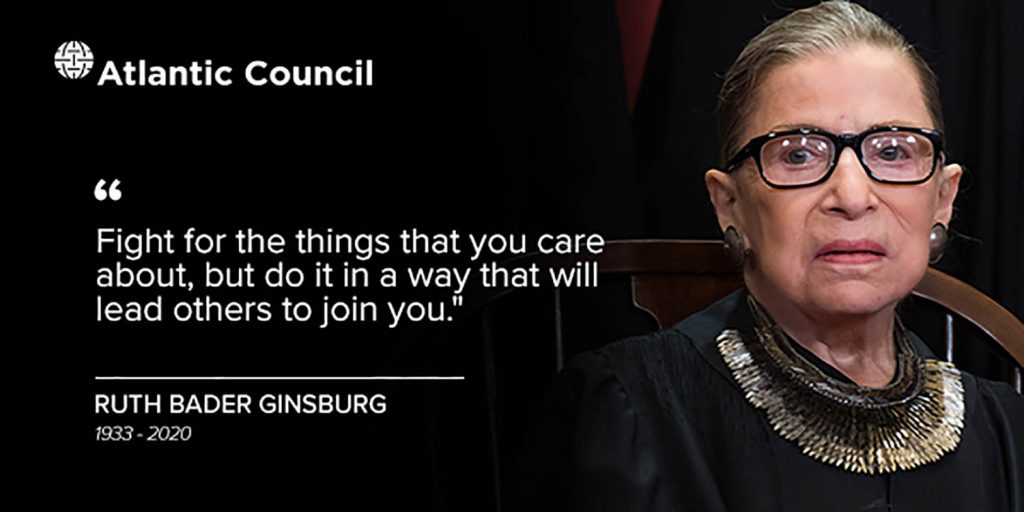
ATLANTIC COUNCIL TOP READS
Image: Bahrain's Foreign Minister Abdullatif Al Zayani, Israel's Prime Minister Benjamin Netanyahu, US President Donald Trump and United Arab Emirates (UAE) Foreign Minister Abdullah bin Zayed gather on the balcony of the White House as they prepare to participate in the signing of the Abraham Accords on September 15, 2020. REUTERS/Tom Brenner
